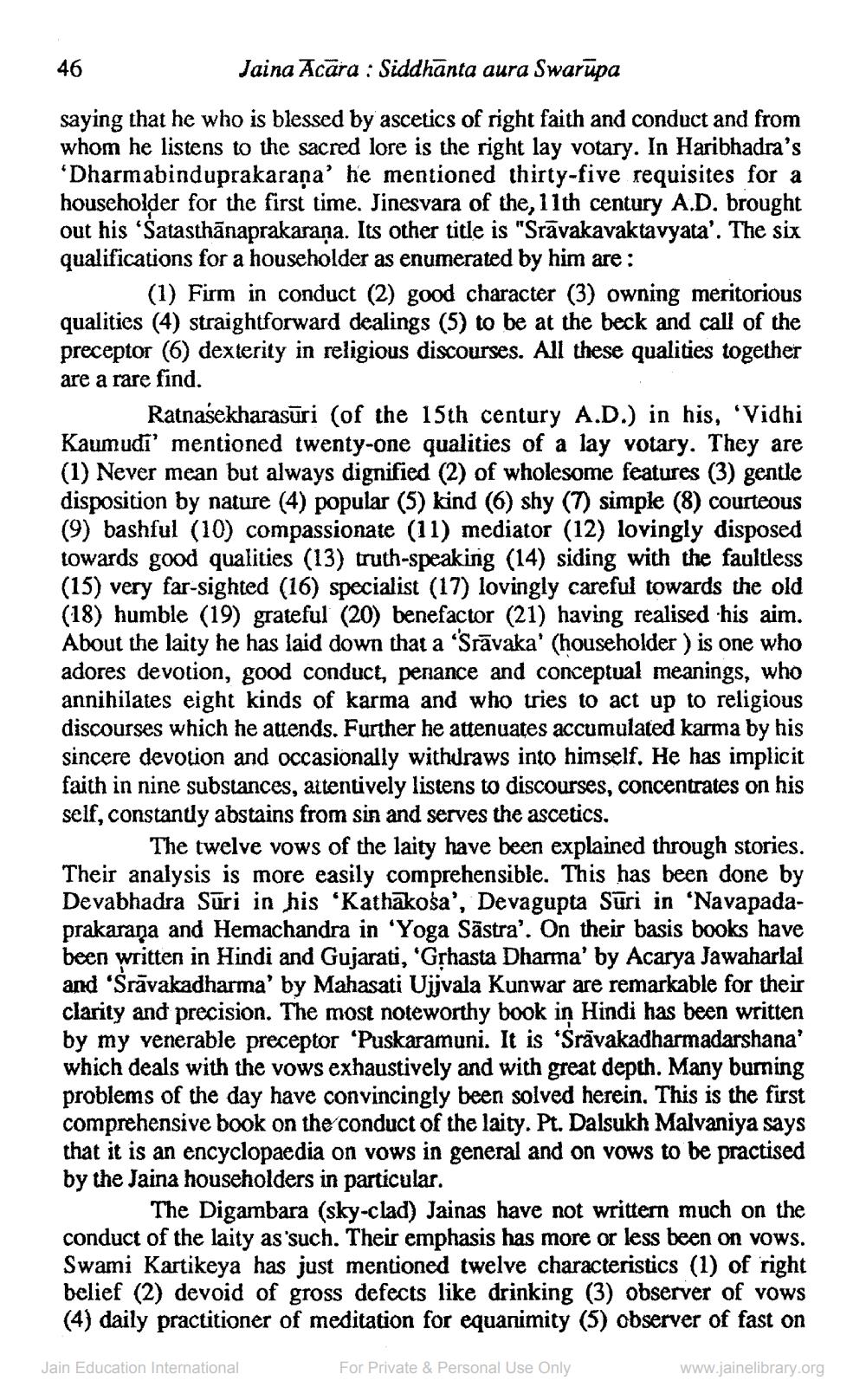________________
46
Jaina Acara : Siddhanta aura Swarūpa
saying that he who is blessed by ascetics of right faith and conduct and from whom he listens to the sacred lore is the right lay votary. In Haribhadra's “Dharmabinduprakarana' he mentioned thirty-five requisites for a householder for the first time. Jinesvara of the 19th century A.D. brought out his 'Satasthānaprakarana. Its other title is "Srāvakavaktavyata'. The six qualifications for a householder as enumerated by him are:
(1) Firm in conduct (2) good character (3) owning meritorious qualities (4) straightforward dealings (5) to be at the beck and call of the preceptor (6) dexterity in religious discourses. All these qualities together are a rare find.
Ratnasekharasūri (of the 15th century A.D.) in his, 'Vidhi Kaumudi' mentioned twenty-one qualities of a lay votary. They are (1) Never mean but always dignified (2) of wholesome features (3) gentle disposition by nature (4) popular (5) kind (6) shy (7) simple (8) courteous (9) bashful (10) compassionate (11) mediator (12) lovingly disposed towards good qualities (13) truth-speaking (14) siding with the faultless (15) very far-sighted (16) specialist (17) lovingly careful towards the old (18) humble (19) grateful (20) benefactor (21) having realised his aim. About the laity he has laid down that a 'Srāvaka' (householder ) is one who adores devotion, good conduct, penance and conceptual meanings, who annihilates eight kinds of karma and who tries to act up to religious discourses which he attends. Further he attenuates accumulated karma by his sincere devotion and occasionally withdraws into himself. He has implicit faith in nine substances, attentively listens to discourses, concentrates on his self, constantly abstains from sin and serves the ascetics.
The twelve vows of the laity have been explained through stories. Their analysis is more easily comprehensible. This has been done by Devabhadra Sūri in his 'Kathākoša', Devagupta Sūri in 'Navapadaprakaraña and Hemachandra in 'Yoga Sāstra'. On their basis books have been written in Hindi and Gujarati, 'Gșhasta Dharma' by Acarya Jawaharlal and 'Srāvakadharma' by Mahasati Ujjvala Kunwar are remarkable for their clarity and precision. The most noteworthy book in Hindi has been written by my venerable preceptor 'Puskaramuni. It is 'Srāvakadharmadarshana' which deals with the vows exhaustively and with great depth. Many burning problems of the day have convincingly been solved herein. This is the first comprehensive book on the conduct of the laity. Pt. Dalsukh Malvaniya says that it is an encyclopaedia on vows in general and on vows to be practised by the Jaina householders in particular.
The Digambara (sky-clad) Jainas have not writtern much on the conduct of the laity as 'such. Their emphasis has more or less been on vows. Swami Kartikeya has just mentioned twelve characteristics (1) of right belief (2) devoid of gross defects like drinking (3) observer of vows (4) daily practitioner of meditation for equanimity (5) observer of fast on
Jain Education International
For Private & Personal Use Only
www.jainelibrary.org




